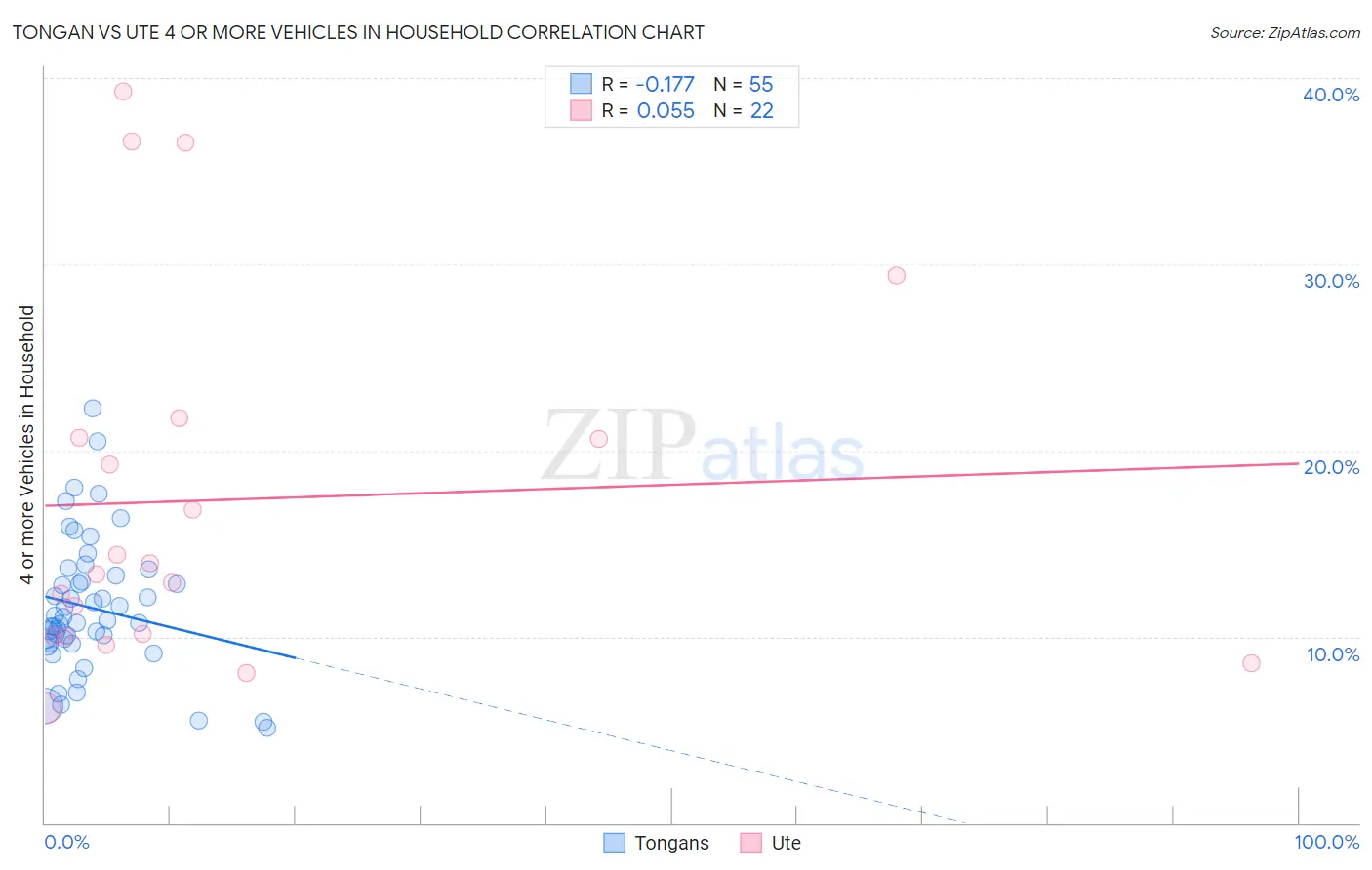Tongan vs Ute 4 or more Vehicles in Household
COMPARE
Tongan
Ute
4 or more Vehicles in Household
4 or more Vehicles in Household Comparison
Tongans
Ute
10.0%
4 OR MORE VEHICLES IN HOUSEHOLD
100.0/ 100
METRIC RATING
4th/ 347
METRIC RANK
8.8%
4 OR MORE VEHICLES IN HOUSEHOLD
100.0/ 100
METRIC RATING
17th/ 347
METRIC RANK
Tongan vs Ute 4 or more Vehicles in Household Correlation Chart
The statistical analysis conducted on geographies consisting of 102,814,982 people shows a poor negative correlation between the proportion of Tongans and percentage of households with 4 or more vehicles available in the United States with a correlation coefficient (R) of -0.177 and weighted average of 10.0%. Similarly, the statistical analysis conducted on geographies consisting of 55,645,386 people shows a slight positive correlation between the proportion of Ute and percentage of households with 4 or more vehicles available in the United States with a correlation coefficient (R) of 0.055 and weighted average of 8.8%, a difference of 14.7%.

4 or more Vehicles in Household Correlation Summary
| Measurement | Tongan | Ute |
| Minimum | 5.1% | 6.2% |
| Maximum | 22.3% | 39.3% |
| Range | 17.1% | 33.1% |
| Mean | 11.6% | 17.4% |
| Median | 10.9% | 13.7% |
| Interquartile 25% (IQ1) | 9.7% | 10.0% |
| Interquartile 75% (IQ3) | 13.3% | 20.7% |
| Interquartile Range (IQR) | 3.6% | 10.6% |
| Standard Deviation (Sample) | 3.6% | 9.8% |
| Standard Deviation (Population) | 3.6% | 9.6% |
Demographics Similar to Tongans and Ute by 4 or more Vehicles in Household
In terms of 4 or more vehicles in household, the demographic groups most similar to Tongans are Immigrants from Fiji (9.6%, a difference of 4.3%), Puget Sound Salish (9.4%, a difference of 6.9%), Native Hawaiian (9.4%, a difference of 6.9%), Spanish American Indian (10.8%, a difference of 7.3%), and Arapaho (9.4%, a difference of 7.3%). Similarly, the demographic groups most similar to Ute are Nepalese (8.7%, a difference of 0.10%), Lumbee (8.8%, a difference of 0.33%), Shoshone (8.8%, a difference of 1.1%), Chinese (8.8%, a difference of 1.1%), and Korean (8.6%, a difference of 1.3%).
| Demographics | Rating | Rank | 4 or more Vehicles in Household |
| Yakama | 100 /100 | #1 | Exceptional 12.9% |
| Colville | 100.0 /100 | #2 | Exceptional 11.1% |
| Spanish American Indians | 100.0 /100 | #3 | Exceptional 10.8% |
| Tongans | 100.0 /100 | #4 | Exceptional 10.0% |
| Immigrants | Fiji | 100.0 /100 | #5 | Exceptional 9.6% |
| Puget Sound Salish | 100.0 /100 | #6 | Exceptional 9.4% |
| Native Hawaiians | 100.0 /100 | #7 | Exceptional 9.4% |
| Arapaho | 100.0 /100 | #8 | Exceptional 9.4% |
| Samoans | 100.0 /100 | #9 | Exceptional 9.2% |
| Paiute | 100.0 /100 | #10 | Exceptional 9.0% |
| Immigrants | Mexico | 100.0 /100 | #11 | Exceptional 9.0% |
| Mexicans | 100.0 /100 | #12 | Exceptional 8.9% |
| Hawaiians | 100.0 /100 | #13 | Exceptional 8.9% |
| Chinese | 100.0 /100 | #14 | Exceptional 8.8% |
| Shoshone | 100.0 /100 | #15 | Exceptional 8.8% |
| Lumbee | 100.0 /100 | #16 | Exceptional 8.8% |
| Ute | 100.0 /100 | #17 | Exceptional 8.8% |
| Nepalese | 100.0 /100 | #18 | Exceptional 8.7% |
| Koreans | 100.0 /100 | #19 | Exceptional 8.6% |
| Pueblo | 100.0 /100 | #20 | Exceptional 8.6% |